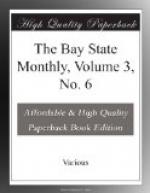William Lloyd Garrison used to tell his friends that it was worth an admission fee just to see Kate Field on the platform, as she made so lovely a picture. Her attitudes—for they are too spontaneous and unconscious to be termed poses—are the impersonation of grace, and, aside from the enjoyment of the intellectual quality and searching political analysis of her lectures, is that of the artistic effect. She gave a course of three lectures on this “Mormon Monster.” They were efforts whose invincible logic, graphic presentation and thrilling power held spellbound her audience. They were a drama of social and political life, and almost unprecedented on the lyceum platform was this eloquence and splendor of oratory, combined with the trained thought, the scholarly acquirement, and the finished eloquence of its delivery. This course of lectures finished there was a popular call for Miss Field to repeat one at Tremont Temple which, by invitation of Governor Robinson, the Mayor and a number of distinguished citizens, she consented to do. The triumph was repeated. From Boston she was invited to lecture in Brooklyn, Philadelphia and Washington. Press and people were alike enthusiastic. It is to the work of Miss Kate Field more than to any other cause, that the present disintegration of Mormon treason is due. Other travellers in Utah have made but the briefest stays, and have been ready to gloss over the tale. Miss Field is telling the truth about it, and she does it with a courage, a vigor, an honesty, and a power that renders it one of the most potent influences in the national life of the times. Kate Field holds to-day the first place on the Lyceum platform of America. She has a rare combination of judicial and executive qualities.
She is singularly free from exaggeration, and her sense of justice is never deflected by personal feeling or emotional impulse. She has that exceptional balance of the intellectual and artistic forces that enables her to give to her lecture a superb literary quality, and to deliver it with faultless grace of manner and an impressiveness of presence rarely equalled. In Kate Field America has a woman worthy to be called an orator.
* * * * *
THE MONUMENT AND HOMESTEAD OF REBECCA NURSE.
BY ELIZABETH PORTER GOULD.
Perhaps the greatest incentive to ideal living in a changing world is the firmly held conviction that truth will finally vindicate itself. When this vindication is made apparent, as in the case of Rebecca Nurse, one of the most striking martyrs of the Salem witchcraft days of 1692, the cause of human progress seems assured. For it is thus seen that truth has within itself a living seed which in its development is destined to become man’s guide to further knowledge and growth. This idea was impressed upon me anew as I stood before the granite monument, some eight and a half feet high, erected this past summer in Danvers,—originally Salem,—to the memory of Mrs. Rebecca Nurse, by her descendants. A carpet of green grass surrounded it, and a circle of nearly twenty pine trees guarded it as sentinels. The pines were singing their summer requiem as I read on the front of the monument these words:—




